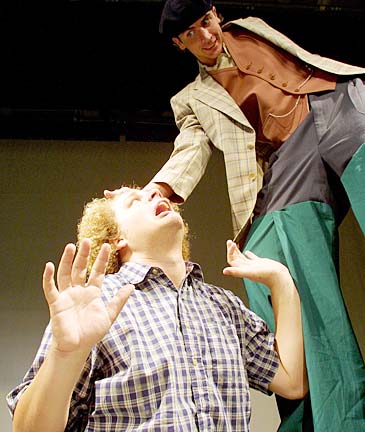


You know Uzbekistan and Turkmenistan, Tajikistan and Afghanistan, Prancer and Vixen. But do you know Dagestan? A battle over the
artist’s soulA UH student from Eastern Europe
stages a Faustian take on creativity vs.
the forces of societyBy Scott Vogel
svogel@starbulletin.comYou will if you spend a few minutes with Elmira Tereschenko, a proud emigrant from that former Soviet republic who is currently studying for a master's degree in theater directing at the University of Hawaii at Manoa. As it happens, Dagestan shares many climatic similarities with Hawaii (believe it or not), thanks to its southern latitude and location on the Caspian Sea.

"I grew up in very warm country by the sea, with hot sun and all that," said Tereschenko, although she later migrated to colder climes and the St. Petersburg Academy of Theater Arts for acting training. "Right after my graduation, I was invited to work in the Derevo Theater Company," an avant-garde ensemble that later toured Europe, "a very untraditional theater company, especially at that time. It was not based on classical Russian traditions and all that."This was in the early 1990s. Derevo's notoriety quickly caught the attention of the Czech Republic's minister of culture, who gave the company a theater, a move that elevated its profile still further. Artistic aspirations eventually led Tereschenko to co-found her own company, Leen-Teatro, an ensemble that also gained a measure of fame in central Europe.
"Then I basically decided to change my life," said the director. "By coincidence, I was invited for a short vacation to Hawaii (in 1998). It sounds corny to say it, but I loved this place right away. It was oceans and mountains and beautiful weather -- all things I enjoyed back in my childhood."
When: 8 p.m. tonight and tomorrow, 2 p.m. Sunday 'Master and Margarita'
Where: Earle Ernst Lab Theatre, University of Hawaii at Manoa
Cost: $9; $7 for seniors, military, faculty; $3 for UHM students
Call: 956-7655
Attracted also by UH's dual emphasis on theater and dance, Tereschenko saw Hawaii as a kind of laboratory where she might experiment with various ideas. She is, after all, a devotee of biomechanics, a style of acting developed by the great Russian director Vsevelod Meyerhold, and one that emphasizes dynamic motion in theatrical expression.
"It involves creating the character with your whole body," Tereschenko said. "We all know the great system of Stanislavsky" -- so-called "method" acting that stresses the appropriation of a fictional character's inner life -- "but even though Meyerhold was Stanislavsky's assistant, he went further, incorporating different theater forms. You don't just work on a character from the inside out, but also the outside in. What I learned from biomechanics was pace, a sense of rhythm, working as an ensemble and an alertness on the stage at every second."
Tereschenko has brought all of this knowledge to bear on "Master and Margarita," playwright Jean-Claude van Itallie's adaptation of Mikhail Bulgakov's classic novel, which plays through Sunday at UH's Earle Ernst Lab Theatre. A twisting of the "Faust" legend, the story concerns a talented writer whose revolutionary ideas threaten to upset the uneasy bureaucratic balance of his society, although here the devil is a force of liberation.
"The theme of the novel is artistic expression oppressed by the repressive society," said Tereschenko, struggling to condense a magnum opus into a few words. "If you have some free time sometime and you're thinking of which book to read, I really suggest that you read 'Master and Margarita,'" a book that "masterfully combines realistic, mundane events with fantasies and surrealism."
Banned during its author's lifetime and a bestseller only after his death, "Master and Margarita" is a dispatch from the front lines in the battle for the Russian soul, but its lessons are by no means valuable only to the citizens of that country.
"I think it is very relevant to what's happening in the world these days," said the director. While the play has direct application to "Stalin's oppressive society and its propaganda," the West's artists have problems of their own. "They sell their souls in a sense, trying to get commissions that they know will pay back. The commercial side of it has unfortunately become more important for a lot of artists that could progress in a different and more interesting way.
"True artists still suffer, and I believe it doesn't matter what political system you live under, because it happens in every society. And it's not only artists, but also philosophers and scientists."
Click for online
calendars and events.